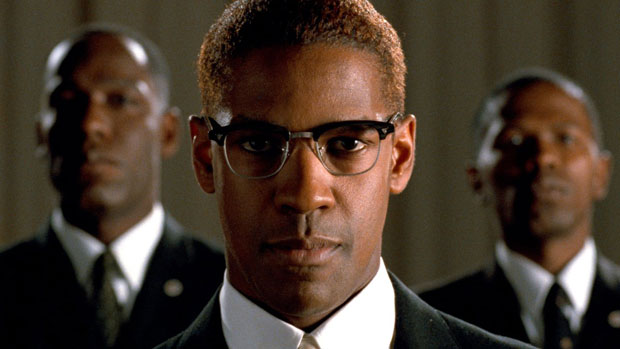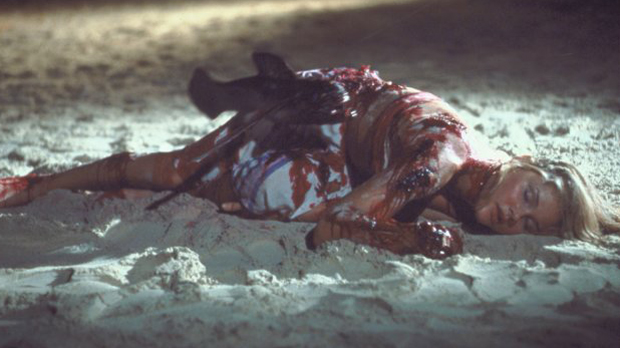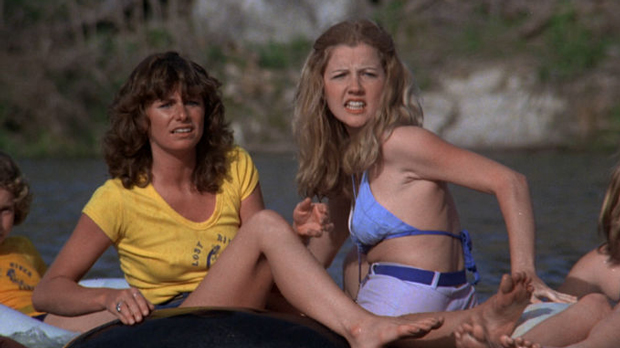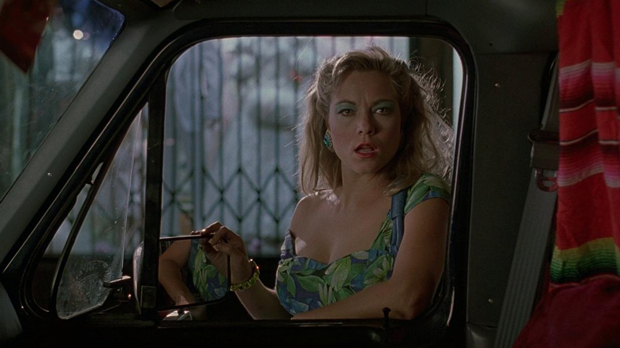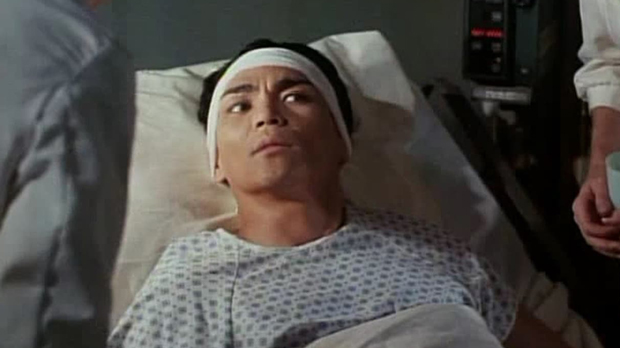 Malcolm X (1992) Warner Bros./Drama RT: 202 minutes Rated PG-13 (violence, drugs, sensuality, language including racial slurs) Director: Spike Lee Screenplay: Arnold Perl and Spike Lee Music: Terence Blanchard Cinematography: Ernest Dickerson Release date: November 18, 1992 (US) Cast: Denzel Washington, Angela Bassett, Albert Hall, Al Freeman Jr., Delroy Lindo, Spike Lee, Roger Guenveur Smith, Theresa Randle, Kate Vernon, Lonette McKee, Tommy Hollis, James McDaniel, Steve White, Ernest Thomas, Jean-Claude La Marre, Wendell Pierce, O.L. Duke, Larry McCoy, Maurice Sneed, Debi Mazar, Phyllis Yvonne Stickney, Scot Anthony Robinson, James E. Gaines, Joe Seneca, LaTanya Richardson, Giancarlo Esposito, Michael Imperioli, Nicholas Turturro, David Patrick Kelly, Beatrice Winde. Special Guest Appearances: Bobby Seale, Reverend Al Sharpton, Christopher Plummer, Karen Allen, Peter Boyle, William Kunstler, Nelson Mandela, Craig Wasson, Ossie Davis (as “Eulogy Performer”). Box Office: $48.2M (US)
Malcolm X (1992) Warner Bros./Drama RT: 202 minutes Rated PG-13 (violence, drugs, sensuality, language including racial slurs) Director: Spike Lee Screenplay: Arnold Perl and Spike Lee Music: Terence Blanchard Cinematography: Ernest Dickerson Release date: November 18, 1992 (US) Cast: Denzel Washington, Angela Bassett, Albert Hall, Al Freeman Jr., Delroy Lindo, Spike Lee, Roger Guenveur Smith, Theresa Randle, Kate Vernon, Lonette McKee, Tommy Hollis, James McDaniel, Steve White, Ernest Thomas, Jean-Claude La Marre, Wendell Pierce, O.L. Duke, Larry McCoy, Maurice Sneed, Debi Mazar, Phyllis Yvonne Stickney, Scot Anthony Robinson, James E. Gaines, Joe Seneca, LaTanya Richardson, Giancarlo Esposito, Michael Imperioli, Nicholas Turturro, David Patrick Kelly, Beatrice Winde. Special Guest Appearances: Bobby Seale, Reverend Al Sharpton, Christopher Plummer, Karen Allen, Peter Boyle, William Kunstler, Nelson Mandela, Craig Wasson, Ossie Davis (as “Eulogy Performer”). Box Office: $48.2M (US)
Rating: ****
Director Spike Lee generated a lot of controversy in 1992 when he called for all African-American schoolchildren to skip school on November 18, the release date of Malcolm X, his biopic of the slain civil rights activist. He said that they’d learn more about black history watching his movie than they would in school. It was a bold move and while I don’t know how many students granted his request, I do know that it ruffled a lot of feathers. Lee also insisted on dealing exclusively with black journalists when doing interviews for Malcolm X, a realization of a lifetime dream to make a movie about one of the most controversial figures of the 20th century. At the time, I wrote film reviews for my college newspaper. My editor, who usually let me pick what movies I reviewed, specifically asked me to write up Malcolm X. I think I know why he gave me the assignment, but since I was planning on seeing it anyway I said sure.
I gave Malcolm X a very favorable review and I stand by it. It’s an extraordinary film. I’d even say it ranks as one of the great movie bios alongside Lawrence of Arabia and Gandhi. With its 3-hour 22-minute running time, it is a true epic. Denzel Washington, in perhaps his greatest performance EVER, plays the man who began life as Malcolm Little, a two-bit hood who led a life of crime, drugs and white women before converting to Islam while in prison. His childhood was a sad one. His father, a minister who advocated for black people to return to Africa, was murdered by white supremacists. He and his siblings were taken away from their mother (by a white social worker) who eventually went insane. Even though he received the best grades in his class, he was discouraged by his white teachers from pursuing a career in law. They told him that, as a “Negro”, he should seek a career that allows him to “work with his hands”.
After a stint as a train porter, Malcolm gets involved with a Harlem gangster named West Indian Archie (Lindo, Clockers) and starts running numbers. He moves onto committing burglaries which is when his luck finally runs out. He’s arrested and sentenced unfairly (multiple sentences of 8-10 years to be served concurrently) for associating with white women during the commission of his crimes. In prison, he meets Baines (Hall, Apocalypse Now) who introduces him to the teachings of Elijah Muhammad and the tenets of Islam. He coverts and ultimately becomes a devoted Muslim and fervent advocate of Black Separatism.
The movie follows Malcolm, who adopts the last name “X” after shedding the one given by slave masters, through his rise to power in the Nation of Islam. His speeches, which draw large crowds, are incendiary in teaching that white people are devils. He becomes so powerful and prominent that other Muslims start to fear him. He eventually parts ways with the Nation and strikes out on his own after a life-changing pilgrimage to Mecca. While in the holy city, he meets Muslims of all colors including white. This causes him to change his views on race, something that doesn’t set well with his former associates. Soon thereafter (February 21, 1965), Malcolm is assassinated by Nation members at the Audubon Ballroom (Manhattan, NY). Obviously, none of what I said is a spoiler. It’s history.
Based largely on Alex Haley’s The Autobiography of Malcolm X (based on a series of interviews with Malcolm conducted by Haley), Malcolm X is a work of tremendous proportion. It’s the story of the extraordinary life of an extraordinary man. What’s truly amazing about is how Lee takes us along on Malcolm’s life journey so we better understand the progression of his thinking. He was a man capable of great change right up until the day he died. He went from being a criminal to being a self-respecting Muslim. He went from being a separatist to being a human rights activist for all races. In other words, Malcolm X was human. We see this thanks to Washington’s magnificent performance, one of enormous breadth. I’ve always admired his acting skills but he surpasses himself in Malcolm X. As much as I like Al Pacino, he stole Best Actor that year. Washington should have taken home the golden statuette. His portrayal of Malcolm at different stages in his life is consistently convincing. He’s equally believable as a zoot-suited hoodlum as he is a conservatively dressed Muslim. It’s even more amazing how he manages to disappear into the crowds of pilgrims heading to Mecca. All I can say is “WOW!”.
Although large in scale, Malcolm X has its share of smaller moments like Malcolm’s relationship with his wife Betty Shabazz (Bassett, What’s Love Got to Do with It), a strong-willed nurse and dietician he first meets after one of his lectures. They begin a courtship that culminates with him proposing to her over the phone. She is his greatest supporter and strongest critic of his dogmatic ways concerning their religion. Their love story is an integral part of Malcolm X: thankfully, Bassett gives a flawless performance as Betty. Also good is Al Freeman Jr. (Down in the Delta) as “The Honorable Elijah Muhammad”, a leader who proves not so honorable, the main reason for Malcolm’s departure from the Nation. Lee adds comic relief as Malcolm’s partner-in-crime Shorty who later rejects his old friend’s efforts at conversion.
The cinematography by frequent Lee collaborator Ernest Dickerson is gorgeous. The early scenes of Malcolm’s days as a criminal come off as surreal in the way he paints them in warm, sensuous colors. One scene in particular stands out. It’s the scene where Malcolm, Shorty and a bunch of nightclub goers do the Lindy Hop to Lionel Hampton’s “Flying Home”. It’s a nice companion piece to a later scene of a group of teens dancing to “Shotgun” (Jr. Walker & the All Stars) at a Harlem rec center while Nation members look for Malcolm who’s in hiding after his house is firebombed.
It’s no exaggeration when I say that Malcolm X is a masterpiece. Not only is it a compelling biopic, it’s also an indictment of racism in our society. Lee loves to push buttons with his movies and he hits the ground running by opening Malcolm X with an American flag burning into the shape of an X intercut with footage of the infamous Rodney King beating the year before. He ends it with schoolchildren standing up and declaring “I am Malcolm X!” after which anti-apartheid activist Nelson Mandela quotes one his speeches. Yet Malcolm X isn’t an angry film like Do the Right Thing. It presents a relatable Malcolm X who ultimately becomes heroic. It doesn’t alienate audiences of other races but rather includes them in the discussion. Lee has done superior work here. It’s lengthy, but Malcolm X draws you in so deeply, you don’t even care how long it is. This is filmmaking at its best. It truly defines the art of cinema.
